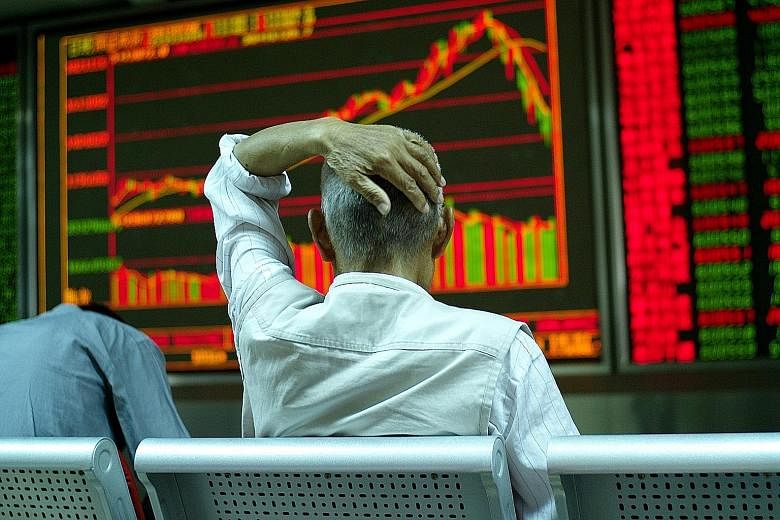BEIJING • Rumour-spreading short sellers and foreign investors with a hidden agenda.
If you believe China's state-run media, those are some of the key culprits for a stock-market rout that erased US$3.2 trillion (S$4.3 trillion) of value in three weeks - or almost US$1 billion for each minute of trading on mainland exchanges.
The underlying message, that market manipulation is fuelling the sell-off, was reinforced by securities regulators pledging to crack down on "vicious" short selling.
The problem with that narrative is that the numbers tell a different story. Short positions on the Shanghai Stock Exchange totalled just 1.95 billion yuan (S$425 million) last Thursday, or less than 0.03 per cent of the country's market capitalisation, as bears closed out more than half their bets since June 12.
Foreign money managers own less than 3 per cent of Chinese shares, but they have been adding to holdings in Shanghai as prices fell.
The more likely reason for the rout, according to analysts, is simply that the nation's longest bull market pushed valuations to unsustainable levels.
Local investors, who borrowed record amounts of money to amplify their bets, lost faith that share prices would keep rising, and are now heading for the exits.
Instead of looking for scapegoats, the authorities should push forward on pledges to reduce the government's role in markets, according to Mr Teng Bingsheng, associate dean at the Cheung Kong Graduate School of Business in Beijing.
Stocks kept sliding last week even as policymakers cut interest rates, relaxed rules on margin trading and reduced transaction costs in an attempt to revive investor confidence.
"They are trying to stop the plunge, but this is clearly the wrong way to do it," Mr Teng said. "The Chinese stock market is already the most manipulated in the world. It's an overheated market and you can't stop people from selling."
The Shanghai Composite tumbled 29 per cent from June 12 through last week, following a 150 per cent surge in the preceding 12 months that sent its median stock's valuation to 108 times earnings.
The gauge sank 5.8 per cent last Friday despite the China Securities Regulatory Commission's announcements that it will investigate short sellers and "strictly" punish market manipulation.
After markets closed, China's financial futures exchange made it more expensive to speculate on stock-index contracts and said it will inspect traders to prevent "deliberate shorting".
Chinese brokers set up a fund to support share prices, while companies suspended plans for initial public offerings to help reduce the supply of new equity.
The Shanghai Composite rose 2.4 per cent at the close yesterday, paring a 7.8 per cent gain at the open. The ChiNext index, dominated by smaller technology companies, slid 4.3 per cent. Hong Kong's Hang Seng Index lost 3.2 per cent.
Even if there is some unlawful trading by short sellers in China, Galaxy Securities says the bearish bets wouldn't be big enough to take down the whole market.
"The core reason for the slump was that the market has gone up too much and valuations of many stocks were extremely high," said Mr Qin Xiaobin, a Beijing-based strategist at Galaxy Securities. "There is not enough evidence... that short sellers are to blame."
As the role of stock markets in China grows, the authorities should worry less about finding someone to blame for swings in securities prices, because they are an inevitable part of an evolving economic outlook, said Dr Hu Xingdou, an economics professor at the School of Humanities and Social Sciences at Beijing Institute of Technology.
He said shares are falling in part because China's growth is slowing.
"The decline is more about the fundamentals of the economy. Investors are getting nervous."
BLOOMBERG

